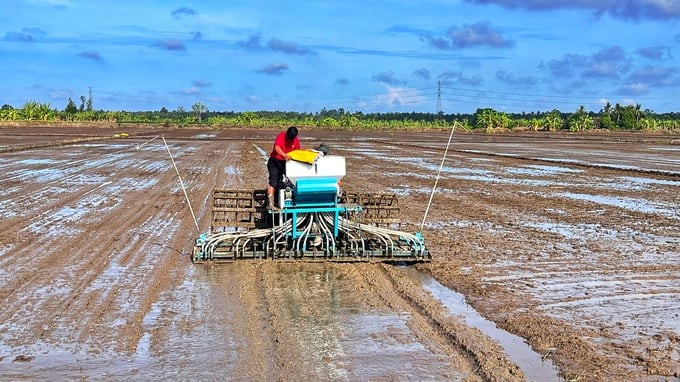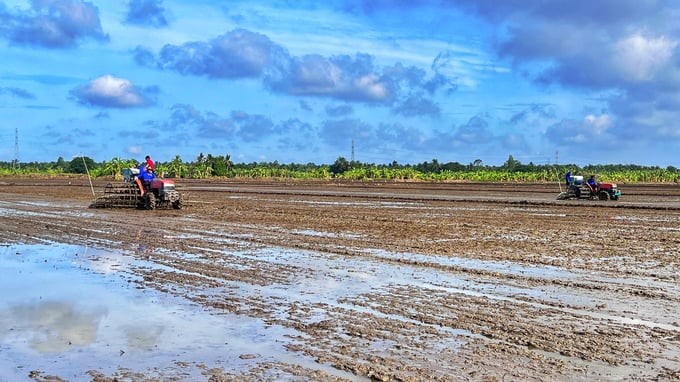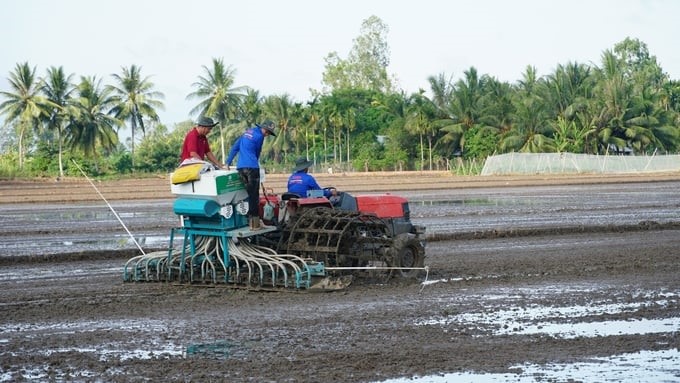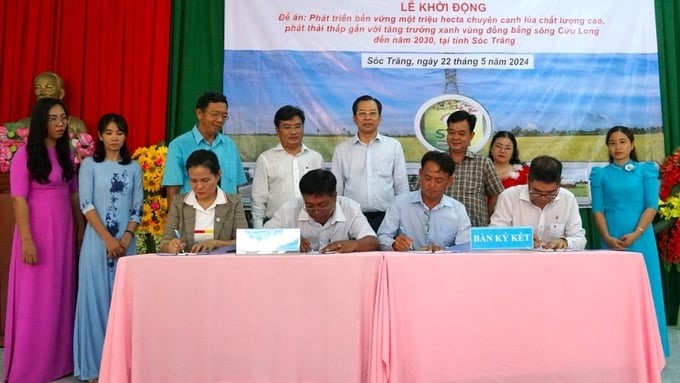November 23, 2025 | 13:24 GMT +7
November 23, 2025 | 13:24 GMT +7
Hotline: 0913.378.918
November 23, 2025 | 13:24 GMT +7
Hotline: 0913.378.918
The pilot emission-reducing rice field in Soc Trang province has a scale of 50 hectares, implemented by Hung Loi Agricultural Cooperative (Long Duc commune, Long Phu district). The model applies sustainable farming solutions, such as using certified seeds; applying alternating wet-dry water management; integrated pest management and straw management towards circular, low-emission agriculture; row sowing by machine combined with burying manure to reduce more than 50% of seeds and 20% of fertilizer, etc., in accordance with the set criteria of the One Million Hectares of High-Quality Rice Project.

After Can Tho city, Soc Trang is the second locality in the Mekong Delta to pilot a emission-reducing rice field model under the One Million Hectares of High-Quality Rice Project. Photo: Kim Anh.
Mr. Truong Van Hung, Director of Hung Loi Agricultural Cooperative, said that in recent times, with the support of the province's agricultural sector, the Cooperative has been transferred and guided in advanced and sustainable production processes. Particularly, the Vietnam Sustainable Agricultural Transformation Project (VnSAT) has supported the Cooperative to effectively apply rice farming techniques of "1 must 5 reductions" and "3 reductions, 3 increases" to the production of ST25 specialty rice associated with consumption linkages. Thereby, helping members save a lot of production costs, stabilizing output, bringing high economic efficiency, and improving income and life for cooperative members.
To effectively implement the emission-reducing rice field model, Mr. Hung committed to complying with the instructions of specialized agencies, ensuring sustainable production.
According to Mr. Tran Tan Phuong, Deputy Director of the Soc Trang Department of Agriculture and Rural Development, the rice industry is one of 10 key industries that the locality focuses on improving efficiency and developing sustainably.

The pilot emission-reducing rice field in Soc Trang province has a scale of 50 hectares, implemented by Hung Loi Agricultural Cooperative (Long Duc commune, Long Phu district). Photo: Kim Anh.
According to Mr. Phuong, in each period, the agricultural sector faces different challenges and growth opportunities. 10 years ago, the challenge of the rice industry in the Mekong Delta, including Soc Trang province, was low quality due to chasing productivity, mainly using chemical materials, and low application of mechanization and post-harvest technology, leading to high costs and loss rates.
As of now, with many positive guidelines, policies, and solutions, those challenges have gradually been overcome. Most clearly, the income of rice growers has improved. Launching the emission-reducing rice field model is a practical action for the Government's commitments.

It is expected that by 2025, the area specializing in high-quality rice cultivation in Soc Trang province will be about 38,500 hectares. Photo: Kim Anh.
"Many research experts have shown that changing farmers' old habits, thinking, and methods is very difficult. But facing the current challenges, without changes to adapt, the agricultural sector in general and rice growers in the Mekong Delta in particular will face more difficulties," Mr. Phuong emphasized.
In the coming time, the Soc Trang Department of Agriculture and Rural Development requests relevant departments and branches to coordinate and propose projects to support in developing infrastructure, transferring technology, applying mechanization, and developing the rice industry chain. This aims to serve low-emission rice production in the province's areas that registered to participate in the One Million Hectares of High-Quality Rice Project.
For the People's Committees of districts, towns, and cities, it is necessary to review the current status and propose public investment infrastructure items to serve high-quality and low-emission rice production. Of which, priority is given to the use of existing resources.
At the same time, consolidate, develop, and expand the scale of production linkages and cooperation among farmer members; improve the operating capacity of the board of directors and directors of cooperatives; and implement close production and consumption linkage contracts with businesses.

Cooperation signing program to link production and consumption of high-quality and low-emission rice between the business providing input services and materials and the rice consumption business with Hung Loi Agricultural Cooperative in three consecutive rice crops (2024–2025). Photo: Kim Anh.
In particular, draw on learning experience and aim at replicating and promoting the scale of low-emission rice cultivation to access revenue from carbon credit payments.
On April 13, 2023, the Soc Trang Provincial People's Committee issued a document registering rice production areas that ensure payment of carbon credits. Specifically, by 2025, the whole province's area specializing in high-quality rice cultivation will be 38,500 hectares, with 78 cooperatives and farmer organizations participating. By 2030, this area will increase to 72,480 hectares, with the participation of over 100 cooperatives and farmer organizations.
Translated by Thu Huyen

(VAN) Ca Mau’s development of OCOP products opens a path to increasing cooperatives value, helping boost income, expand markets, and affirm collective economy's role.

(VAN) Turning seemingly ordinary coconut shells into unique jewelry and artwork, Nguyen Bang Nhi spreads the value of local culture through her brand, Cocohand.

(VAN) Results from the Sustainable Durian Model Project in Dak Lak have confirmed the critical role of Yara Viet Nam in transferring advanced nutritional solutions to farmers.

(VAN) In Tuyen Quang province, livestock farmers have introduced effective models and innovative practices that significantly strengthen African Swine Fever prevention and control efforts.

(VAN) This is the study conducted by IRRI and Can Tho University on the rice straw value chain in Mekong Delta showing an economic potential of more than 6.6 trillion VND/year.

(VAN) By participating in cooperative economics, many farmers in Tay Ninh have overcome hardship, mastered clean dragon fruit cultivation techniques.

(VAN) The crossbreeding program in the former Binh Dinh province (now part of Gia Lai) has shown signs of decline, and urgent measures are needed to revive it and sustain past achievements.